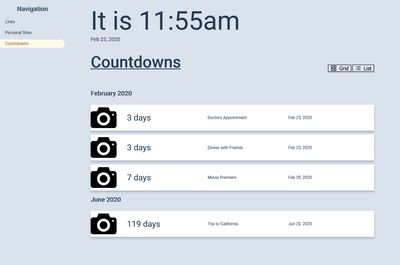Creating a SMS bot to notify of upcoming events with GitHub Actions and Twilio
Posted on:
When I open my web browser, there is a page I developed where I can see upcoming events.

To extend this to be timely and relevant, I setup a GitHub Actions workflow that grabs the upcoming week's alerts and sends a text message using Twilio to notify me when I get into work on Mondays what is upcoming in the week. This is going to walk through how that workflow was implemented
Setup Twilio
For notice, Twilio offers a free trial but afterwards a phone number usually only costs $1.00 a month and $0.0075 per SMS. If you don't have a Twilio account, go through the how to use your free trial account walkthrough.
Next, follow the steps in the Node Quickstart in the Twilio Docs to purchase a phone number and get the account SID and auth token. You can stop after the "Send an Outbound SMS Message with Node.js" step as that is all that is needed for this.
Create our data
Now, we will create a JSON file that will be where all of our events will be stored.
[
{
"title": "Doctors Appointment",
"date": [2020, 1, 25]
},
{
"title": "Dinner with Friends",
"date": [2020, 1, 25]
},
{
"title": "Movie Premiere",
"date": [2020, 1, 29]
},
{
"title": "Trip to California",
"date": [2020, 5, 20]
}
]Each entry will have a title and date. Note the month which is the 2nd number in the array starts counting at 0. So 1 is February in this case.
The Node script
The script needs two external node modules: moment to do some date math and twilio to send the SMS using Twilio's APIs
npm init
npm install moment twilio
Then, the script is as follows
const fs = require("fs");
const path = require("path");
const moment = require("moment");
const twilio = require("twilio");
let thisWeekEvents = [];
// Dynamically load in the JSON
const countdowns = JSON.parse(
fs.readFileSync(path.join(__dirname, "..", "countdowns.json")).toString(),
);
// Filter through all of the events taht are in the next 7 days from right now
countdowns.forEach((event) => {
let hoursTillEvent = moment(event.date).diff(moment(), "hours");
if (hoursTillEvent > -1 && hoursTillEvent < 24 * 7) {
thisWeekEvents.push(event);
}
});
// if we have events, start creating the body of the SMS message
if (thisWeekEvents.length > 0) {
let str = `This week's events (${moment().format("ll")})\n`;
thisWeekEvents.forEach((event) => {
str += "- " + event.title + "\n";
});
let client = twilio(process.env.twilio_sid, process.env.twilio_auth_token);
// then pass it through the twilio client and make the call
client.messages
.create({
body: str,
from: process.env.from_num,
to: process.env.to_num,
})
.then((message) => console.log(message))
.catch((err) => console.error(err));
}Then be sure to bundle it down so when we push the code up to GitHub, all of the code is available. Check out Bundling NPM modules for use in GitHub Actions for a reference on how to do this.
GitHub Actions Workflow
Next we can setup a workflow file that will trigger this once a week.
name: Weekly Text Workflow
on:
schedule:
- cron: "0 12 * * 1" # 12PM UTC on Mondays -> 7AM ET
jobs:
send_text:
name: "Twilio Notification"
runs-on: ubuntu-latest
steps:
- uses: "actions/checkout@v2"
- name: "Send Text"
env:
twilio_sid: $
twilio_auth_token: $
from_num: $
to_num: $
run: node dist/index.jsThe various credentials can be setup in the Secrets tab under the settings for the Repository.
Once deployed to GitHub, every Monday at 7AM ET, a message will appear on my phone letting me know what is upcoming in the week. This could be improved and extended in multiple ways including:
- Pulling from better data sources (Google Calendar / Outlook Calendars)
- Have more workflows so if something has a high priority, you could get a SMS the day of